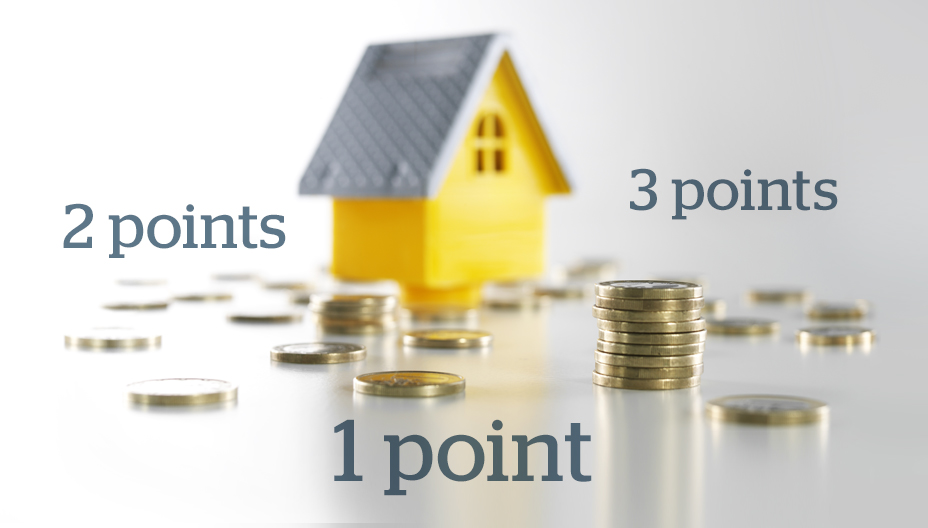Learn
What does it mean to buy mortgage points?

Are you considering taking out a mortgage or refinancing your existing home loan? If so, you may wonder whether you should purchase mortgage points to lower your interest rate.
This article provides an overview of what's involved in purchasing points and insight into whether doing so is a wise financial decision.
How do mortgage points work?
Mortgage points — also referred to as discount points or loan origination fees — are a type of upfront payment made to a lender to lower the interest rate. One point is equal to 1% of the total loan amount.1 You pay the points at closing, so they increase your closing costs.
For example, if you take out a $500,000 loan, one point would cost 1% of the loan amount, or $5,000. Two points would cost 2% of the loan amount, or $10,000.
Lenders typically decrease your interest rate by a quarter of a percentage point for every point you buy.2 So, buying two points would lower your interest rate by 0.5%. Most lenders allow borrowers to purchase between one and three points, although some allow more or less.
Is buying mortgage points worth it?
When buying mortgage points, it's important to determine when you will break even.
To calculate the break-even point, you'll need to consider both the upfront cost of purchasing points and how much money you'll save in interest every month. To do this, divide the total upfront cost of the points by the amount you'll save every month.
For example, let's say you're taking out a 30-year, $500,000 mortgage. Your interest rate without points would be 7.00%. If you purchase two points, you will pay an additional $10,000 upfront, and your interest rate will be 6.50%.
Without points, your monthly principal and interest payments would total $3,327. Buying two points lowers your payment to $3,160, saving $167 per month.
 Lenders typically decrease your interest rate by a quarter of a percentage point for every point you buy.
Lenders typically decrease your interest rate by a quarter of a percentage point for every point you buy.
To calculate your break-even point, divide the $10,000 you paid to buy the points by $167.
10,000 / 167 = 59.88
So, it would take roughly 60 months (5 years) to break even. This means you must keep the loan for at least 60 months to recoup the cost of purchasing points. Buying points may not make sense if you plan on selling your home or refinancing your mortgage within that period.
If your break-even point is several years out, there's a chance that interest rates could drop significantly. Refinancing your mortgage at a lower rate before you reach the break-even point means you would have paid points for no reason. Of course, it's impossible to predict the future and where rates will go, so consider the risks and benefits before deciding whether buying points is right for you.
Mortgage points and tax deductions
Another aspect of paying points that could figure into your decision is potential tax benefits. You may be able to deduct the points you paid on your mortgage, but there are a few rules to keep in mind.
First, you must itemize deductions to deduct points.
Next, your total home acquisition debt must be below $750,000 ($375,000 if you're married and file a separate return from your spouse).3
Finally, you must determine how you deduct your points. If you meet the following requirements, you can deduct them in full the year you paid them:4
- Loan proceeds will be used to buy or refinance your primary residence (not a rental property or vacation home).
- Paying points is an established business practice in your area.
- Points you paid weren't more than is typically charged in your area.
- You didn't finance the cost of points into your mortgage loan.
- Points were computed as a percentage of the loan amount.
- Your settlement statement clearly shows the amount as points, origination fees, loan discount, or discount points.
If you don't meet the above requirements, you would spread your deduction over the life of the loan. For example, if you paid $10,000 in points on a 30-year mortgage, you could deduct $333 per year.
Ultimately, the decision to purchase points depends on your financial situation. For some people, buying mortgage points can be a great way to reduce long-term interest costs. However, it's essential to consider your break-even point to see whether buying points makes sense for you.
When you’re shopping for a house and a mortgage, it’s beneficial to understand the numbers. Find a Synovus Mortgage Loan Officer online to help you.
Important disclosure information
This content is general in nature and does not constitute legal, tax, accounting, financial or investment advice. You are encouraged to consult with competent legal, tax, accounting, financial or investment professionals based on your specific circumstances. We do not make any warranties as to accuracy or completeness of this information, do not endorse any third-party companies, products, or services described here, and take no liability for your use of this information.
- CFPB, “What are (discount) points and lender credits and how do they work?" updated September 4, 2020, accessed January 4, 2023. Back
- Kate Collins and Jason Stauffer, “Mortgage Points Are Becoming More Attractive in Today's Rising Rate Environment. Are They Worth It?" NextAdvisor, published July 22, 2022, accessed January 4, 2023. Back
- IRS, “Topic No. 505 Interest Expense," updated January 3, 2023, accessed January 4, 2023. Back
- IRS, “Topic No. 504 Home Mortgage Points," updated October 14, 2022, accessed January 4, 2023. Back
People are also reading
Do you have questions or ideas?
Share your thoughts about this article or suggest a topic for a new one
